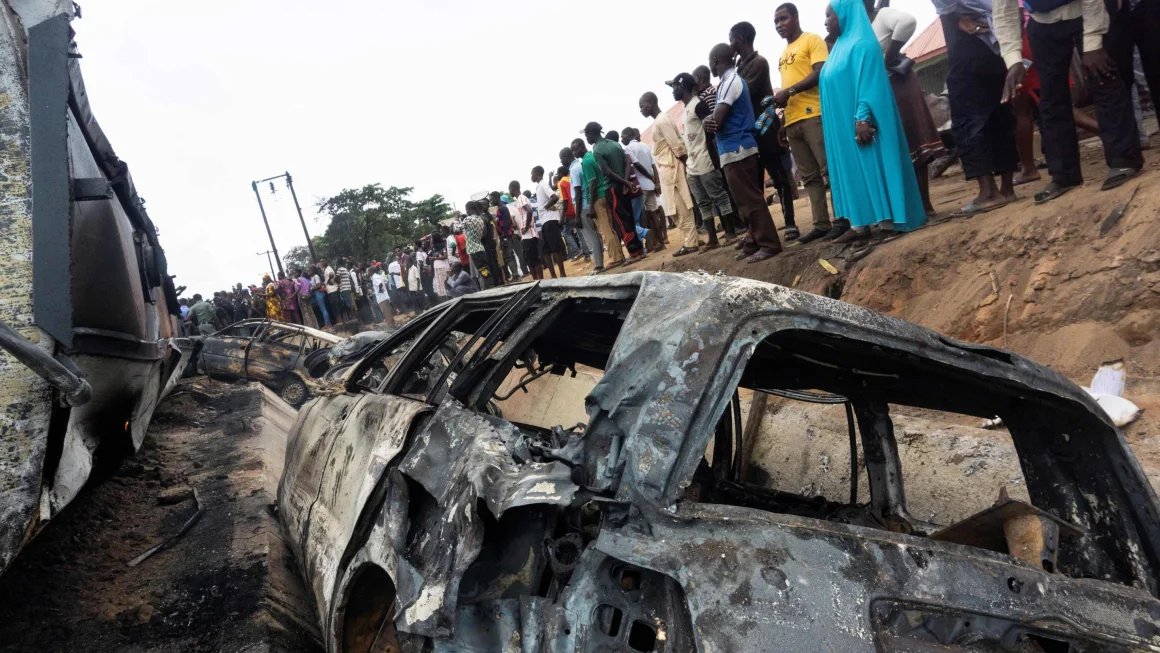The Major Energies Marketers Association of Nigeria (MEMAN) has advocated for the reintroduction of rail transport for fuel distribution to help curb the rising number of truck accidents on Nigerian roads. MEMAN’s Chief Executive Officer, Mr. Clement Isong, made this call in an interview on Saturday, February 22, 2025, in Lagos.
On February 19, the Federal Government announced a ban on fuel tankers exceeding 60,000 litres from operating on the country’s roads, citing safety concerns and the need to reduce frequent accidents involving heavy-duty petroleum trucks. The Nigerian Midstream and Downstream Petroleum Regulatory Authority (NMDPRA) stated that the restriction would take effect from March 1.
Referencing the underlying reason for this order, Mr Isong underscored the alarming frequency of truck accidents in the country, emphasizing that rail transport presents a safer and more efficient alternative. He explained that shifting fuel distribution to rail would significantly reduce the number of fuel tankers on the road, thereby minimizing accident risks.
Commenting on the Federal Government’s decision to restrict fuel tankers exceeding 60,000 litres, Isong explained that the regulation was introduced following consultations with stakeholders in the downstream petroleum sector, as well as government agencies responsible for road infrastructure, safety, and security.
He stated that the decision aligns with the United Nations’ Second Decade of Action for Road Safety and its five pillars: road management, vehicle safety, post-crash care, road user behavior, and enforcement of traffic laws.
“This measure reflects a concerted effort to safeguard our roads and mitigate the environmental and safety risks posed by overloaded trucks. The increasing number of fuel tanker accidents has raised serious concerns, and this regulation aims to curb hazardous incidents,” Isong said.
He warned that overloaded trucks, particularly those carrying petroleum products, are more prone to brake failures, rollovers, and loss of control—factors that significantly endanger road safety.
“While the new regulation is a positive step, the real challenge lies in ensuring its effective enforcement across the country. The government must also optimize distribution channels to prevent supply chain disruptions, particularly when trucks are recalled,” he added.
Isong emphasized the need for strict enforcement of the regulation, with clear penalties for non-compliance. He also advocated investments in technology to monitor compliance and urged authorities to prioritize the repair of tanker routes.
To ensure continuous product supply and improved safety, he called for the development of better transport alternatives, including an expanded rail network and improved pipeline infrastructure. He further urged the government to provide financial support for transporters to redesign their tankers in line with the new regulations.
Addressing truck drivers, Isong urged them to comply with the regulations for the collective good, stressing that adherence would make the roads safer for everyone. He encouraged drivers to stay well-trained, remain updated on safe driving practices, and ensure their vehicles were in optimal condition before each trip.
“Proper journey management is essential. Avoid alcohol while driving, as it impairs your ability to control the vehicle. Regularly inspect your truck for malfunctions and report any issues to your supervisors,” he advised.
He also called on fuel marketers to invest in smaller, safer tankers, conduct periodic integrity checks on their fleet, and ensure that only well-trained drivers handle petroleum product transportation. He urged marketers to leverage technology to monitor operations and enhance safety measures, such as establishing control centers to track trucks in transit and ensure compliance with safety procedures.
“Work closely with your logistics teams to streamline loading processes and uphold stringent safety standards,” he noted.
Isong stressed the importance of continuous driver training and retraining, recommending that tanker drivers undergo mandatory annual training on good driving culture, product knowledge, and safety protocols at loading depots and on the road.
“All training is crucial. In fact, tanker drivers should regularly take defensive driving courses. Unfortunately, Nigeria lacks a dedicated training school with a specialized driving track for tanker drivers,” he lamented.
He suggested that the government collaborate with private investors, including TotalEnergies to complete the tanker driver training school under construction in Ibadan.
“This facility, which includes an integrity check center for trucks and a driving track, could serve as a model training school for tanker drivers. Only certified, professionally trained drivers should be allowed to operate petroleum tankers, with certification provided by the Federal Road Safety Corps (FRSC) after completion of the training program,” he said.
While acknowledging that rail transport is a better option than trucks, Isong noted that pipelines remain the most effective solution and should be prioritized for development. He pointed out that rail could transport larger volumes of petroleum products more efficiently than trucks, potentially lowering long-term costs.
“To make this a reality, the government must invest in the necessary infrastructure and designate specific rail lines for petroleum product transportation. Though this will take time, it could greatly enhance the safety and sustainability of the industry,” he concluded.








F*ckin’ awesome things here. I am very glad to see your article. Thank you a lot and i am looking ahead to contact you. Will you please drop me a e-mail?
Wohh just what I was searching for, regards for putting up.
I like this web site very much, Its a rattling nice billet to read and receive information. “Practice, the master of all things.” by Augustus Octavius.
wonderful issues altogether, you just received a emblem new reader. What would you suggest about your submit that you just made some days in the past? Any sure?
Perfect work you have done, this website is really cool with fantastic information.
Thank you for another fantastic article. The place else could anybody get that kind of info in such an ideal way of writing? I have a presentation next week, and I’m on the search for such info.
I got what you mean , appreciate it for posting.Woh I am lucky to find this website through google.
Good website! I truly love how it is simple on my eyes and the data are well written. I’m wondering how I might be notified when a new post has been made. I’ve subscribed to your RSS feed which must do the trick! Have a nice day!
Useful information. Fortunate me I found your site by accident, and I’m shocked why this coincidence didn’t happened earlier! I bookmarked it.
F*ckin’ awesome things here. I’m very glad to see your post. Thanks a lot and i am looking forward to contact you. Will you kindly drop me a e-mail?
I do like the manner in which you have framed this particular situation plus it does indeed give me personally a lot of fodder for thought. On the other hand, because of just what I have witnessed, I simply trust when other feed-back pile on that men and women continue to be on issue and don’t start on a tirade associated with some other news du jour. All the same, thank you for this fantastic point and though I can not necessarily concur with this in totality, I respect the standpoint.
you’re in point of fact a good webmaster. The site loading velocity is amazing. It sort of feels that you are doing any unique trick. Furthermore, The contents are masterpiece. you have performed a great job on this matter!
I will right away seize your rss feed as I can’t find your e-mail subscription hyperlink or e-newsletter service. Do you have any? Please permit me recognize so that I may just subscribe. Thanks.
The next time I read a blog, I hope that it doesnt disappoint me as much as this one. I mean, I know it was my choice to read, but I actually thought youd have something interesting to say. All I hear is a bunch of whining about something that you could fix if you werent too busy looking for attention.
It is really a nice and useful piece of info. I am glad that you shared this useful information with us. Please keep us informed like this. Thanks for sharing.
I couldn’t resist commenting